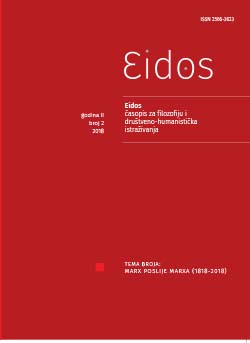Prvi Jonjani i psyche
First Ionians and Psyche
Author(s): Željko KaluđerovićSubject(s): Ancient Philosphy
Published by: Udruženje za filozofiju i društveno-humanistička istraživanja “Eidos”
Keywords: first Ionians; water; air; psyche; breath; life; man; cosmos;
Summary/Abstract: In this paper the author analyses the origins of the philosophical concept of the soul which was founded by Thales and Anaximenes. The study of available sources has shown that Aristotle, while taking into account his alleged view that the stone has a soul because it moves iron, classified Thales in the category of thinkers who believed that the soul was the cause of motion. The author, then, concludes that the view that soul is intermingled in the whole is related to the famous phrase attributed to Thales according to which “all things are full of gods”. If we connect these formulations with statements about the lodestone and amber, then we shall arrive to a possible conclusion that, according to the first physicist, all things are ensouled i.e. alive, both organic and inorganic parts of the cosmos. If these are authentic Thales’ views, then he is “the fo¬under … of philosophy” because he talks about the unity of the entire reality, and because in this way the unity of wholeness is vitalistically established. The focus of the author’s study, then, were the two reference and interrelated Anaximenes’ doctrines: the doctrine of the air as a principle and his animatism. The paper discusses Anaximenes’ opinion on the aliveness and the ensoulment of all, which could be also explained by the continuous air mobility and its observable manifestations. The original principle, as Anaximenes understood it, was understood as eternal and therefore necessarily self-inflicted or self-animated, in a word, the soul or life (psyche). Observing and recognizing that the air is cosmic equivalent of the soul, i.e. of the life in man, could be an important motive for the last of Milesians to choose aer as arche of all. And not only that, but according to the hylozoistic view which Anaximenes substantially followed, the structure of the cosmos had to be at the same time the structure of life. It is possible, finally, that the dual use of the word pneuma in his second fragment (DK13B2), led Anaximenes to the parallelism and analogy of man and the cosmos and to essential identity of microcosm and macrocosm.
Journal: Eidos - časopis za filozofiju i društveno - humanistička istraživanja
- Issue Year: 2018
- Issue No: 2
- Page Range: 133-146
- Page Count: 14
- Language: Serbian

